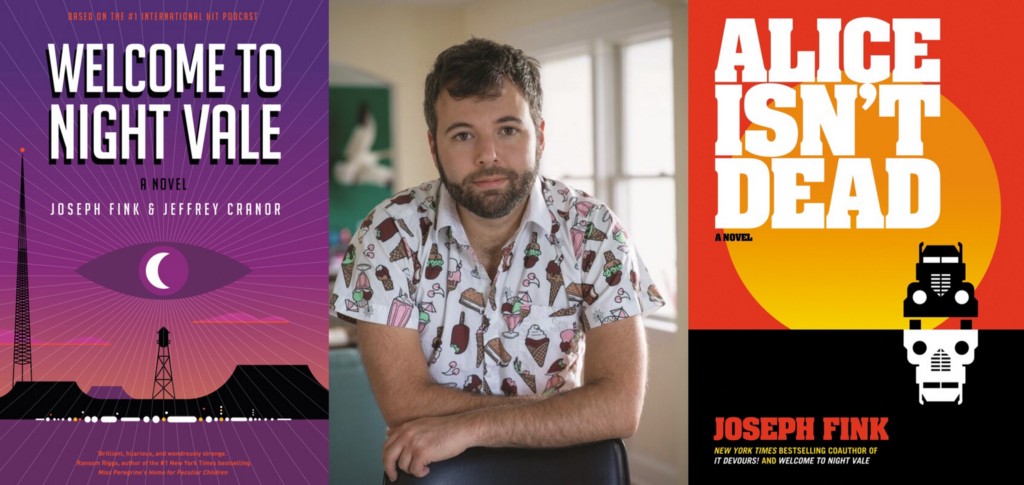interviews
How Joseph Fink Uses Comedy to Make Serious Writing Hit Home
The co-creator of “Welcome to Night Vale” and writer of “Alice Isn’t Dead” on the emotional value of humor

Writer and podcaster Joseph Fink’s universe is a bustling one. Like the characters and themes in the beloved Welcome to Night Vale podcast, Fink’s many creative endeavors swirl about him like so many planets with complementary orbits. Along with Jeffrey Cranor, Fink co-created the eerie, playful sci-fi narrative Night Vale as well as novels that expand on its mythos (Welcome to Night Vale, It Devours!); he produced a meditative nonfiction podcast with musician John Darnielle (I Only Listen to the Mountain Goats); and he wrote the gothic mystery Alice Isn’t Dead, a podcast whose associated novel will be released in October.
Regardless of his medium or underlying message, however, Fink always endows his work with an easy, tongue-in-cheek sense of humor. We asked Fink about the nature of comedy in his fiction in advance of his appearance at the new hybrid literature and improv series LitProv at Symphony Space.
Joseph Fink appears at the launch of LitProv alongside Melissa Broder and comedians Dave Hill and Dulcé Sloan at Symphony Space in Manhattan on September 13.

Matthew Love: In the broadest terms, when you’re reading a piece of fiction, what is the value of humor for you?
Joseph Fink: Humor is an integral part of human life, so a work that is entirely humorless often feels inhuman. Even in our darkest moments, there is humor, and to represent it otherwise makes the story ring false. There are always exceptions to every rule, of course.
ML: Humor is certainly a component of Night Vale, as well as your novels, but how essential do you find it?
JF: In my own work? I suppose it’s part of my voice, and I don’t spend a lot of time anymore thinking about my voice. There was a time in which I was actively trying to find it and build it, but now I just sit down and write, and trust that what comes out sounds like me. That usually includes some jokes.
Radio Dramas Aren’t Just for the 1930s Anymore
ML: How different should comedy feel in a script versus in prose, as when you’re working on the Alice Isn’t Dead podcast and then the book? How much do you think about the difference between the two when you write?
JF: I approach all writing based on what medium I am writing toward. A script for a podcast and a novel are written entirely differently. A podcast is written to be listened to, obviously, and so the sound of the words is much more important. It’s also being written for a performer, and so as a writer you think about giving the performer gifts, little moments they can work with and make their own. With a novel, you are thinking about a visual rhythm and have a much more direct connection with the reader, but this connection is also quiet and inward-looking. It’s more difficult to make someone laugh in print.
Even in our darkest moments, there is humor, and to represent it otherwise makes the story ring false.
ML: How possible is it to be simultaneously humorless and artful? Any favorite work that eschews laughter and still achieves greatness?
JF: Well, as I said above, it creates a feeling of artificiality when humans are entirely humorless. However, artificiality is not necessarily bad. There can be a solemnity to humorlessness, a feeling of a kind of religious ceremony. One work that I can think of that has little to no humor is It Follows, one of my favorite movies. It uses the quiet and the lack of humor to build a feeling of marching towards an ending that is horrible and unavoidable. The lack of human warmth is used to the advantage of the mood it is creating.
ML: There are recurring characters or conceits in comic storytelling, such as the hyper-articulate, precocious child or the personification of deities or animals. Are there any comic ideas that will always be funny to you?
JF: A cat attempting to jump somewhere and instead falling to the ground clumsily will always be funny.








